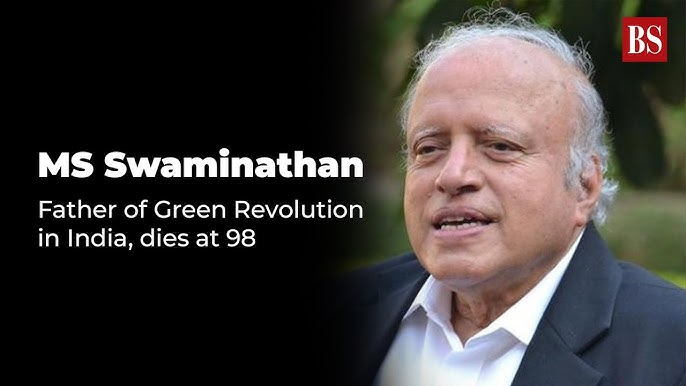Description

Copyright infringement not intended
Picture Courtesy: Business Standard
Context: M. S. Swaminathan passed away on September 28, 2023, at the age of 98 at his residence in Chennai. His contributions to Indian agriculture and his commitment to improving the lives of farmers will be remembered for generations to come.
Key Highlights
- S. Swaminathan was born in 1925, in Tamil Nadu, India. He completed his education in agricultural science, earning a Bachelor's degree from the University of Madras and later obtaining a Ph.D. in Genetics from the University of Cambridge.
- Swaminathan is often referred to as the "Father of India's Green Revolution" for his groundbreaking work in agricultural research and development. He played a crucial role in the development of high-yielding varieties of rice and wheat, which helped transform India from a food-deficit nation to a self-sufficient one.
- Key Roles in Agricultural Research: Throughout his career, Swaminathan held various significant positions in agricultural research and policy-making, including Director of the Indian Agricultural Research Institute, Director General of the Indian Council of Agricultural Research (ICAR), and Secretary to the Government of India, Department of Agricultural Research and Education.
- Scientific Contributions:
- Swaminathan made significant contributions to the understanding of potato genetics and the development of frost-resistant potato varieties.
- He conducted research on the cytogenetics of hexaploid wheat, contributing to the development of high-yielding wheat varieties.
- He played a role in efforts to grow rice with C4 carbon fixation capabilities, which would improve photosynthesis and water usage.
- Swaminathan's work on radiation botany included the study of mutagens and the effects of radiation on plant responsiveness to fertilizers.
- National Commission on Farmers: In 2004, he was appointed as the chair of the National Commission on Farmers, which aimed to address farmer distress and improve the agricultural sector. The commission's recommendations, including the proposal for a Minimum Support Price (MSP) at least 50% higher than production costs, had a significant impact on Indian agriculture.
- Awards and Recognitions: Swaminathan received numerous awards and honours for his contributions to agriculture and science. Notably, he was awarded the first World Food Prize in 1987 and received the Padma Shri, Padma Bhushan, and Padma Vibhushan, among other accolades.
- MS Swaminathan Research Foundation: Following his World Food Prize win, Swaminathan established the MS Swaminathan Research Foundation (MSSRF) in Taramani, Chennai, to continue his work in agricultural research and sustainable development.

Conclusion
- S. Swaminathan's legacy in the field of agriculture and food security in India is profound. His work not only helped alleviate hunger but also improved the livelihoods of millions of farmers across the country.
|
PRACTICE QUESTION
Q. What were some of the key contributions and achievements of M.S. Swaminathan in the field of agriculture, and how did his work impact food production and sustainability in India and globally?
|
















